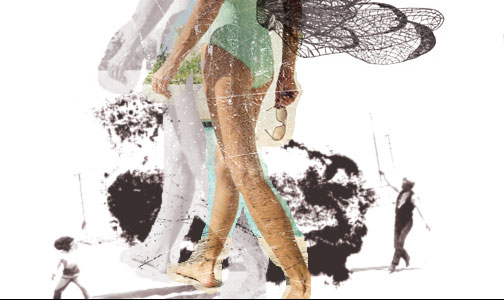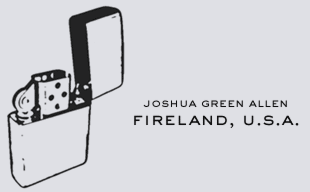
The Fireland Electromagnetic News Service / 20 October 1999
The ouija board spelled out F-I-R-E-L-A-N-D-Good-bye! all tickly beneath our fingers, this being Maia and me, the beige plastic shuddering, pinpricks in our nail beds, tiny white seeds embedded in the pink of my fingernails indicating a zinc deficiency, moving further from the quick with the speed of an hour hand.
Maia twitched then, her eyes going dead dead, those eyes that usually just plain knocked me out, those eyes that bled life, really, and then it’s gone, snuffed, and she’s shaking, her hands no longer on the board, sorta backing up on her haunches, her panties decorated with tiny airplanes, propellers ablur.
Then she came back to me, then she shook her fist: “The Giant City Electromagnetic News Service,” she said, her voice suddenly complex with tobacco, deepened with memory. Her breath smelled like talcum powder. We were in the rec room.
“The quality of those stories — I mean, they were stories. Even if it was just a paragraph, I’d find the story there, and I’d tell it like one. Beginning, middle, end. Sometimes no middle. Middles were frowned upon in those days. Folks didn’t care about middles. Nowadays, middle is all you get. I bet you don’t even know what I mean by ‘middle,’ that’s how indoctrinated you are.”
I nodded.
“The AP,” Maia said. “We were kings back then. Back then there was a work ethic, and we were always looking for ways to be better, cleaner, faster. We wanted to break down the barriers between the Event and the Reporting and the Consumption. We had a holy vision, we all shared it, this idea of a miracle, Josh, a miracle where something would happen, somebody would get assassinated, some treaty would be signed, a cat’d be pulled out of a tree, and the people would know about it instantly.” Maia snapped her fingers, the fingernails free of deposits and yet tasting, I knew, and oh yes, of ancient bookpaper and of soil. My stomach lurched with incestuous nausea as I caught myself voyaging, as I had so many times before (never got old!), into the rarified air that was trapped between her breasts.
I nodded. “We don’t even have the people anymore.”
“It was Abe who had the Big Vision. We all shared the idea of the miracle, but he was the one who actually saw how it could work.”
“The machine,” I said.
Maia raised an eyebrow. “She told you?”
“It gave me nightmares for weeks, that story.”
She shrugged. “I guess that’s to be expected. It gave me nightmares for the rest of my days. It was so damnably violent. It hurt so much, this thing, tiny little knives, little needles, all over your body, like little bees buzzing in your veins, trying to get out, stinging and stinging.
“But I’ll tell you what.
“Once I wiped the sweat out of my eyes and took a good look around, the teletype would burst into life, chattering away, relaying the story, the beginning and the middle and the end of everything I saw, describing it concisely and objectively. It was beautiful.” That came out like beeyootifull. Her diphthongs were devolving, taking on the dry heat of Texas.
“So who was it?” I asked, leaning forward so she would do the same. “Who destroyed it?”
Maia tightened her lips, cutting off the flow of blood. Then: “Kingston. But he didn’t destroy it. He took it. He swiped it! He left Angel screaming and full of bloody holes, the teletype glass shattered. Six months later, the Giant City Electromagnetic News Service appeared, the King at the helm, beating out all of us — we used to drink with him! — getting to press hours before us, sweeping up all the awards.”
“But,” I said.
“But,” and Maia smiled humorlessly, “But he and his staff were in Bedlam by the end of the year. They all had their own language, nothing anyone had ever heard of, and they couldn’t understand anyone or each other. It was like Babel all over again.”
I moved even closer and reached out to caress her bare shoulder. “And that’s where you went, huh?” I said. “You were there with them.”
Maia lowered her eyes, staring right through the board between us. “Tell your grandmother. And tell her I was just trying to keep the work ethic alive.”
“That’s a can-do.”
Maia reached out and roughly messed up my hair, then went limp. When she looked up again, confused, I kissed her on each eye and she murmured quietly in a sleepy, wordless voice, preverbal, and our lips intertwined like flushed, ruddy vines and the past seven weeks tumbled forward, whirlpooling around the rec room, peeling the wood paneling from the walls, puncturing the swollen heart of the beanbag, and we asked each other, soundlessly, what we should do next, to top ourselves, and her tongue tasted like a blinding future, full of the unbearably sweet shock of bees coursing through our veins.
Previously / The Vertical Brush
Next / Threnody: Jos
